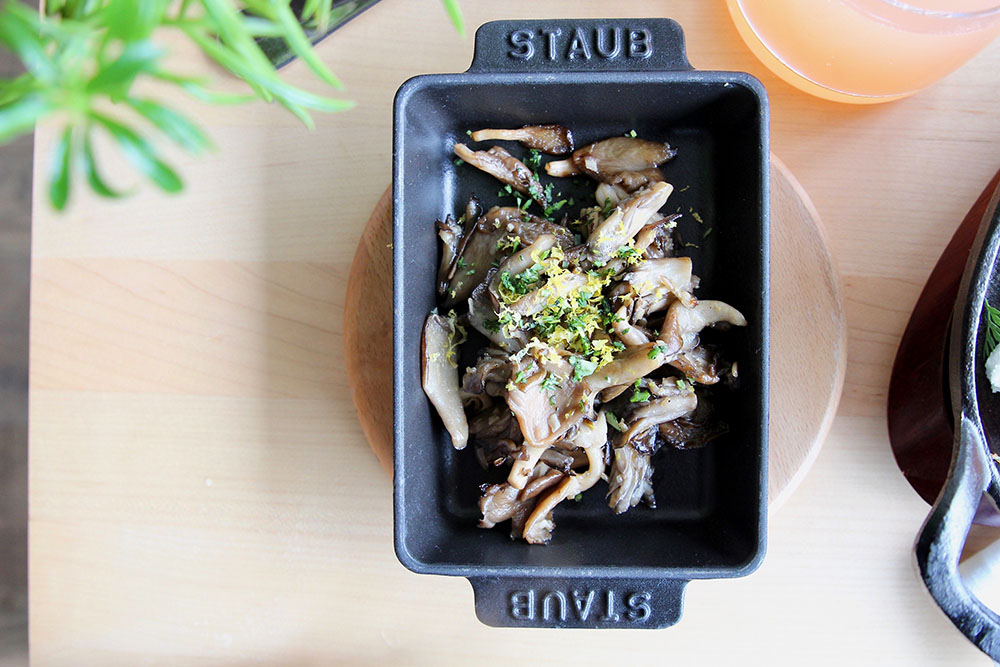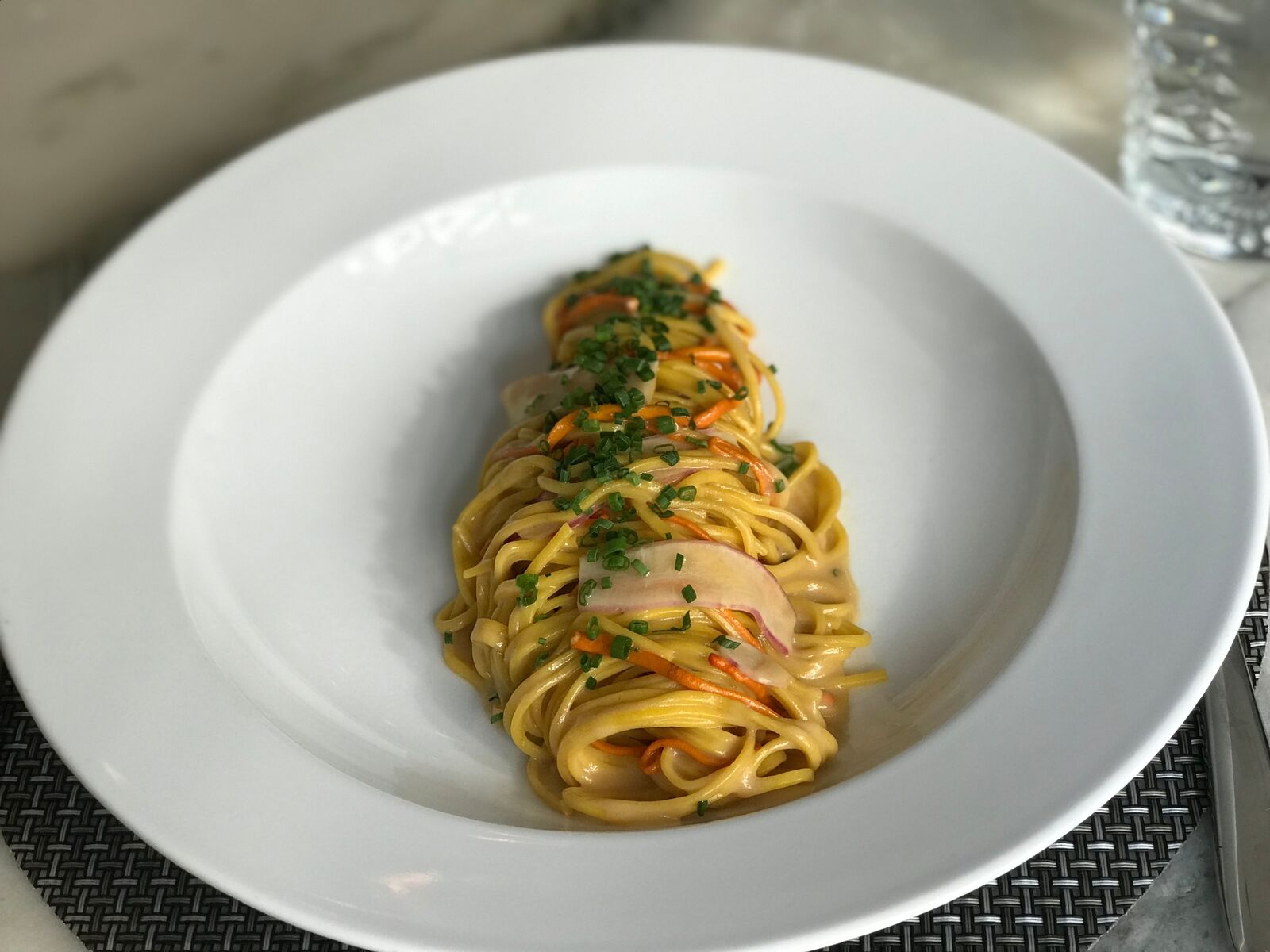
Make the Most of Summer Mushrooms
Chefs share how they’re preparing five seasonal funghi varieties at restaurants and at home.
While white mushrooms and the ubiquitous baby bellas are popular in supermarkets across America, summer brings out more uniquely shaped and flavored mushroom varieties, ripe for creativity in the kitchen.
Low in calories and fat and high in savory umami flavor, mushrooms have been dubbed nutritional powerhouses, packed with fiber, vitamins and minerals. Better yet, the funghi are versatile — dozens of varieties can be served raw, pickled, seared, sautéed and even blended with ground meats to help stretch protein and preserve the environment.
We asked five chefs which mushrooms are exciting them this summer and what they’re doing with the power ingredient to make the most of this season’s finds.
Marinate Wood Ear Mushrooms
Wood ear mushrooms are brown, grow on wood and resemble the shape of ears. This variety is typically dried in grocery stores and can be found fresh at New York’s greenmarkets in the summer.
"I love cooking with different kinds of mushrooms, so I get really excited when wood ear mushrooms arrive at the farmers market,” says ICE alum Simone Tong (Culinary, ’11), chef-owner of Little Tong in New York. “They're very popular in my native China, and I love the earthy flavor and crunchy texture they bring to a dish. At Little Tong, I serve them marinated on top of fresh liangban scallops with celtuce (a Chinese lettuce), trout roe, goji berries, grapefruit tapioca pearls and fermented chili brown butter sauce. Then, the whole dish is presented tableside in a cloud of tea-hickory smoke."
To pick high-quality, first wood ears, Tong looks for whole, succulent and firm mushrooms. They can also be added to stir fries for texture, sauteed with other vegetables or simmered in broth or soups.
Sauté Wild Mushrooms
Wild mushrooms are foraged in forests and coastal areas, with popular American varieties often found in the Pacific Northwest. Regionally, wild mushroom varieties vary in flavor, shape and texture, and many are commercially cultivated in America.
"When I’m shopping for mushrooms at markets, I look for a few things: variety, price and the care that has been taken to make sure they aren’t broken or damaged,” says Janelle Reynold, executive chef at Austin, Texas’ new Rosedale Kitchen and Bar. She recommends checking Asian supermarkets for high-end, affordable options, though currently, she’s vibing with Texas-grown funghi. For her restaurant, Chef Janelle sources a cultivated mix through Regalis food service. “The quality has been outstanding and the price is competitive,” she says.
This summer, Rosedale is featuring the Texas-grown, cultivated mushrooms as a side dish. “The mushrooms are simply sautéed with garlic and shallot, a bit of white wine and finished with butter,” Chef Janelle explains. “We finish them with lemon zest and fresh herbs from our culinary garden."

Roast or Pickle Maitake
Maitake, or hen-of-the-wood, mushrooms have polypores, which absorb flavor. These grow in clusters at the base of trees, and the supple mushrooms are edible raw.
“It’s all about how they smell,” says Bogdan Danila, executive chef of Bluebird London NYC and the newly opened Queensyard. He looks for firm maitakes with good perfume and flavor that are dry upon receipt, for optimum quality. “Many people associate mushrooms with the more damp and cool climate of the summer, but there are ample summer mushrooms, like maitake, that are incredibly versatile in our seasonal dishes and offer a delicate, almost feathery texture to dishes,” Chef Bogdan says. Cleaning and trimming the maitakes is essential, and beyond that, they can be enjoyed pretty much any way — roasted, pickled or lightly pickled so that they’re practically raw.
Grill Chanterelles
A type of wild mushroom, chanterelles have an irregular bell-like shape and can be golden or white. The stems are completely edible.
“What's special about summer mushrooms is because of the heat, they produce exquisite and refined flavor profiles,” says Personal Chef Lisa Pucci Delgado. An ambassador for Big Green Egg, Chef Lisa enjoys cooking mushrooms outdoors in the summer, using a heat-proof pan and raising the temperature on high to about 500 F. To prep, she washes and dries the mushrooms by hand to prevent bruising, especially knowing the chanterelles will be the protagonist of any dish. “These mushrooms are not meant to be hidden in anything; these mushrooms are the star of the plate. They are the main attraction,” Chef Lisa says. She’ll saute them in butter with thyme, garlic and shallots, and grill mushroom kabobs or bacon-wrapped mushrooms stuffed with cheese.
Toss Raw Cordyceps

Dubbed the “coolest mushroom ever” by MushroomExpert.com, cordyceps are essential funghi that grow vertically on insects, which sounds gross until you remember all your food is grown around bugs.
"Cordyceps have a vibrant orange color, a great texture that mimics a spaghetti noodle when they are slightly wilted and provide a great savory umami flavor,” says Chef/Owner Remy Pettus of Bardo restaurant in Minneapolis. “They're also delicious raw with a slight chewiness." Inspired by the unique shape and color, Chef Remy is serving cordyceps with spaghetti topped with raw shaved porcini. When the spaghetti is lifted out of the boiling water, the cordyceps are tossed in raw and wilt in the noodles.
Bardo also uses morels, porcini, matzutake and umbrella polypore mushrooms from Forage North.
Pursue a future in plant-based cooking with Health-Supportive Culinary Arts.


Add new comment